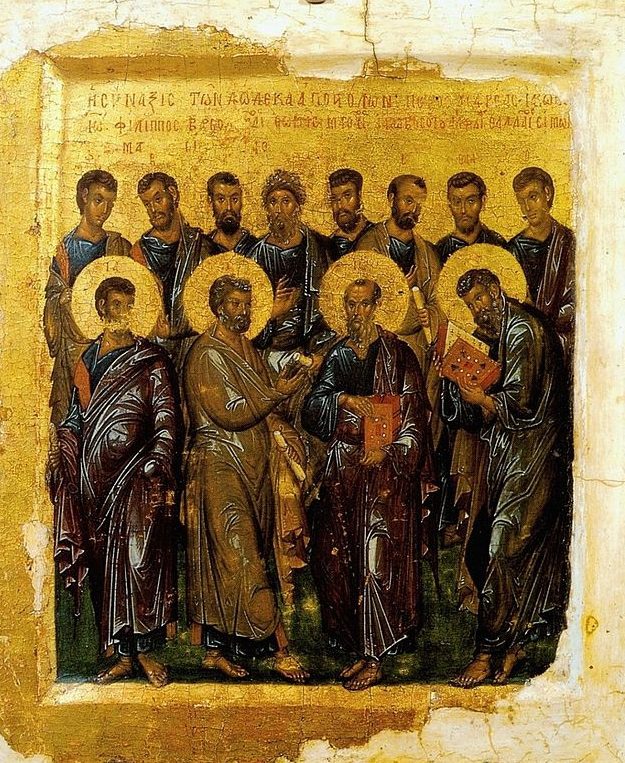
* * *
The office of apostle was unique. Apostles did not become bishops.
Wrong. I need only bring Eusebius to the stand to refute this assertion:
All that time most of the apostles and disciples, including James himself, the first Bishop of Jerusalem, known as the Lord’s brother, were still alive . . . (History of the Church, 7:19, tr. G. A. Williamson, Baltimore: Penguin Books, 1965, 118)
James is called an apostle by St. Paul in Galatians 1:19 and 1 Corinthians 15:7. That James was the sole, “monarchical” bishop of Jerusalem is fairly apparent from Scripture also (Acts 12:17; 15:13, 19; 21:18; Gal 1:19; 2:12).
— they appointed them to oversee the churches they had established. The episcopate is not an ‘apostolic college’. ‘Apostolic succession’ is not a perpetuation of the apostles. The Apostolic Age ended with the death of the apostle and evangelist Saint John the Theologian.
Of course we agree with this.
‘Apostolic succession’ refers to the overseers — episkopos — the office established by the apostles to be their successors (but not their equals!) thereby ensuring the preservation of the Holy Catholic and Orthodox Faith — ‘the faith which was once delivered unto the saints’ [Jude 1:3].
Well, as shown, bishops since the apostles are obviously not apostles, but on the other hand, apostles may become bishops, as James and Peter did.
Since there is no perpetuation of the apostles, ‘the role of Peter’ is not ‘a part of the succeeding “college”‘.
It is Church government by analogy. Jesus set His Church up a certain way, and we have a clear record of that. St. Peter was at the very least foremost of the disciples, or held a primacy of honor. Do Orthodox not want to follow the biblical model (not to mention that of the historical early Church)? Many Orthodox accept Petrine primacy (not supremacy, of course). Assuming that, who, then, is the analogous “foremost among equals” amongst Orthodox today? Or is that a matter of competing opinion also?
In the Septuagint (the Greek translation of the Old Testament), episkopos is used for overseer in various senses, for example: officers (Jud 9:28; Is 60:17), supervisors of funds (2 Chr 34:12, 17), overseers of priests and Levites (Neh 11:9; 2 Ki 11:18), and of temple and tabernacle functions (Num 4:16). God is called episkopos at Job 20:29, referring to His role as Judge, and Christ is an episkopos in 1 Peter 2:25 (RSV: Shepherd and Guardian of your souls).
The Council of Jerusalem (Acts 15:1-29) bears witness to a definite hierarchical, episcopal structure of government in the early Church. St. Peter, the chief elder (the office of pope) of the entire Church (1 Pet 5:1; cf. Jn 21:15-17), presided and issued the authoritative pronouncement (15:7-11). Then James, bishop of Jerusalem (kind of like the host-mayor of a conference) gives a concurring (Acts 15:14), concluding statement (15:13-29) . . .
Much historical and patristic evidence also exists for the bishopric of St. Peter at Rome. No one disputes the fact that St. Clement (d.c. 101) was the sole bishop of Rome a little later, or that St. Ignatius (d.c. 110) was the bishop at Antioch, starting around 69 A. D. Thus, the “monarchical” bishop is both a biblical concept and an unarguable fact of the early Church.
By the time we get to the mid-second century, virtually all historians hold that single bishops led each Christian community. This was to be the case in all Christendom, east and west, until Luther transferred this power to the secular princes in the 16th century, and the Anabaptist tradition eschewed ecclesiastical office either altogether or in large part. Today many denominations have no bishops whatsoever.
One may concede all the foregoing as true, yet deny apostolic succession, whereby these offices are passed down, or handed down, through the generations and centuries, much like sacred tradition. But this belief of the Catholic Church (along with Eastern Orthodoxy and Anglicanism) is also grounded in Scripture: St. Paul teaches us (Eph 2:20) that the Church is built on the foundation of the apostles, whom Christ Himself chose (Jn 6:70; Acts 1:2, 13; cf. Mt 16:18).
In Mark 6:30 the twelve original disciples of Jesus are called apostles, and Matthew 10:1-5 and Revelation 21:14 speak of the twelve apostles. After Judas defected, the remaining eleven Apostles appointed his successor, Matthias (Acts 1:20-26). Since Judas is called a bishop (episkopos) in this passage (1:20), then by logical extension all the apostles can be considered bishops (albeit of an extraordinary sort).
If the apostles are bishops, and one of them was replaced by another, after the death, resurrection, and ascension of Christ, then we have an explicit example of apostolic succession in the Bible, taking place before 35 A. D. In like fashion, St. Paul appears to be passing on his office to Timothy (2 Tim 4:1-6), shortly before his death, around 65 A.D. This succession shows an authoritative equivalency between apostles and bishops, who are the successors of the apostles.
As a corollary, we are also informed in Scripture that the Church itself is perpetual, infallible, and indefectible (Mt 16:18; Jn 14:26; 16:18). Why should the early Church be set up in one form and the later Church in another? All of this biblical data is harmonious with the ecclesiological views of the Catholic Church. There has been some development over the centuries, but in all essentials, the biblical Church and clergy and the Catholic Church and clergy are one and the same.
*****
Meta Description: Basic biblical arguments in favor of apostolic succession are briefly explained.
Meta Keywords: apostolic church, Catholic, Catholic authority, church authority, Church government, church infallibility, conciliar infallibility, hierarchical church, hierarchy, infallibility, magisterium, papal authority, papal infallibility, Rule of Faith, Three-Legged Stool, visible church, apostolic succession












